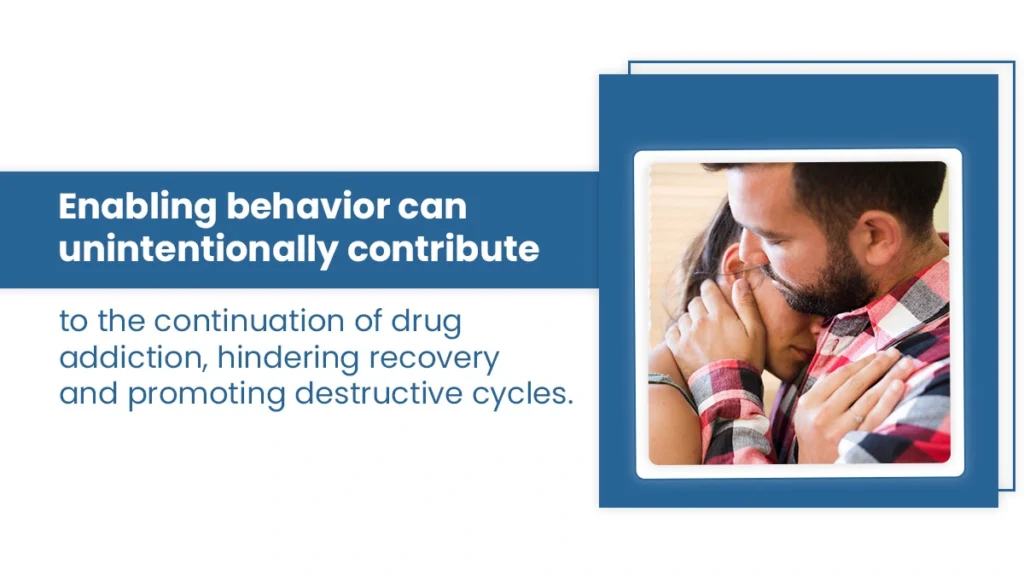Drug addiction can profoundly impact the lives of those struggling with it, as well as the people who care about them. The challenges posed by addiction extend beyond the individual and often infiltrate the very fabric of their relationships. Understanding the dynamics between drug or alcohol addiction and relationships is crucial to provide support and promote healing.

When someone battles drug addiction, the effects ripple through their interpersonal connections, be it with family, friends, or romantic partners. This article explores the complex interplay between drug addiction and relationships, shedding light on both parties’ emotional, psychological, and practical challenges.
Key Takeaways
Drug addiction can have a profound impact on relationships, affecting both the addicted individual and their loved ones. Here’s what you need to know about addiction and relationships:
- Enabling behavior can unintentionally contribute to the continuation of drug addiction, hindering recovery and promoting destructive cycles.
- Drug addiction can strain personal relationships, leading to emotional turmoil, conflicts, and a breakdown in trust.
- Trust issues, financial instability, and codependency are common challenges faced in romantic relationships affected by drug addiction.
- Recovery from drug addiction requires support, professional treatment, and a commitment to making positive changes, leading to the prospect of healthy and fulfilling relationships.
Are you ready to reclaim your life and rebuild your relationships? Take the first step today by contacting The Haven Detox-Little Rock at (501) 271-3342 for a life-changing journey to freedom.
Drug Addiction: Overview
Drug addiction, also known as substance addiction, is when a person becomes dependent on drugs, making it difficult to control their drug use. Addiction can occur with various substances, such as alcohol, prescription medications, or illicit drugs. It is characterized by compulsive drug-seeking behavior, despite harmful consequences.
When someone is addicted to drugs, their brain chemistry is altered, leading to intense cravings and a loss of control. This can devastate their health, relationships, and overall well-being. It is important to understand addiction as a medical condition that requires support and treatment.
How Drug Addiction Begins
Drug addiction often starts innocently, with individuals experimenting or seeking comfort from emotional or physical pain. They may turn to drugs to cope with problems or escape from reality. For example, a person facing financial issues or experiencing chronic disease may resort to substance use to numb pain or distress.
Understanding the Influence of Addictive Substances
Different substances can have varying effects on relationships. For instance, alcohol abuse can lead to mood swings, conflicts, and domestic violence, damaging the bond between spouses, parents, and children. Drug addiction can disrupt daily lives, creating financial problems and a vicious cycle of dependence.
The Intersection Between Relationships and Substance Use
In relationships affected by drug addiction, a codependent relationship may develop. Codependent individuals enable the addicted person’s behavior, inadvertently prolonging the addiction cycle. To break this pattern, seeking professional help and engaging in family therapy or support groups can be among the best things a family member or close friend can do.
Effects of Drug Addiction on Personal Relationships
Here are some common effects of drug addiction on personal relationships:
The Emotional Toll of Drug Addiction
Drug addiction significantly affects personal relationships, affecting the emotional well-being of the addicted individual and their loved ones. The strain of drug abuse can lead to a broad range of emotions, like sadness, anger, frustration, and worry. Others may feel hurt, betrayed, or confused by the actions of the drug addict.
Strained Family Relationships
Family relationships often bear the brunt of drug addiction. The dynamics within the family unit can become strained, leading to conflicts, arguments, and a communication breakdown. Parents may feel helpless and desperate as they witness their child’s descent into addiction. Siblings may experience neglect or resentment, overshadowed by the addiction problem.
Deteriorating Friendships
Friendships can also suffer greatly when one person succumbs to drug addiction. Close friends may witness their once vibrant and dependable companion transform into a different person, consumed by their drug of choice. Trust erodes, and the addicted individual’s priorities may shift, causing them to neglect their friendships and engage in risky behaviors.
The Impact of Drug Addiction on Romantic Relationships
Drug addiction can significantly impact romantic relationships, often leading to strained dynamics, emotional turmoil, and a breakdown in trust. The effects can be devastating for individuals struggling with addiction and their partners. Here are some common ways in which drug addiction can impact romantic relationships:
Trust Issues Due to Addiction
Drug addiction can cause significant trust issues in romantic relationships. The lies, deceit, and broken promises associated with addiction erode the trust between partners. The addicted individual’s actions may become unpredictable, leading their partner to question their honesty and reliability. Rebuilding trust can be a long and challenging process.
Financial and Legal Consequences
Drug addiction often has financial and legal consequences that strain a romantic relationship. The costs of supporting the habit can lead to money problems and financial instability. Legal issues stemming from drug use, such as arrests or fines, can also strain the relationship.
The Dangers of Codependency
Codependency is a common trait in relationships affected by drug addiction. Codependent partners may enable the addicted individual’s behavior, sacrificing their well-being and needs in the process. They may neglect their own self-care and mental health, becoming consumed with caring for the addicted person. This dynamic can be detrimental to both partners and hinder the recovery process.
Enabling Explained
Enabling behavior can unintentionally contribute to the continuation of drug addiction. By shielding the addicted individual from the consequences of their actions, enabling prevents them from recognizing the need for change. It can create a sense of dependency and hinder their motivation to seek help or take responsibility for their addiction. Breaking the cycle of enabling is essential for fostering recovery and promoting healthier relationships.
Understanding the Concept of Enabling
Enabling is a behavior that inadvertently supports and perpetuates drug addiction. It involves actions or behaviors by family members, friends, or significant others that shield the addicted individual from the negative consequences of their substance use. Enabling may include:
- Providing financial support.
- Making excuses for their behavior.
- Covering up the effects of their addiction.
Enabling versus Helping: Recognizing the Difference
It is essential to distinguish between enabling and genuine help when dealing with drug addiction. Helping involves actions that support the addicted individual’s recovery, such as encouraging them to seek professional treatment, providing emotional support, or setting healthy boundaries. Enabling, on the other hand, inadvertently allows the addiction to continue by minimizing its impact and shielding the addicted person from facing the consequences of their actions.
The Repercussions of Enabling
Enabling drug addiction can have severe repercussions for the addicted individual and their loved ones. It can prolong the addiction, prevent the addicted person from seeking help, and perpetuate a destructive cycle. Enabling may also lead to strained relationships, financial difficulties, and emotional turmoil within the family or social circle. Recognizing enabling behaviors and breaking the cycle is crucial for promoting positive change.
Helping a Loved One Struggling with Substance Abuse
Supporting a loved one suffering from substance abuse is a challenging task. By providing emotional support, actively listening, and offering encouragement to your addicted loved one, you can make a significant difference in their recovery.
Remember to take care of yourself as well, seeking guidance from professionals and support groups to navigate the complexities of addiction. Together, you can overcome this obstacle and foster a healthier future.
Recognizing the Signs of Addiction
It is crucial to identify the signs of addiction in a loved one. These symptoms may include:
- Changes in behavior
- Mood swings
- Withdrawal from activities
- Neglecting responsibilities.
- Weight loss
- Bloodshot eyes.
By being aware of these signs, you can better understand the extent of the problem and provide appropriate support.
How to Approach the Topic with Your Loved One
Approaching the topic of substance abuse with a loved one requires sensitivity and understanding. Choose a suitable time and place to have an open and non-judgmental conversation.
Express your concerns for their well-being and emphasize that you are there to support them. Encourage them to seek professional treatment and offer to help them find resources and support groups.
Navigating Rehabilitation
Helping a loved one navigate the complex process of a rehab center can be overwhelming. Educate yourself about addiction treatment programs and seek guidance from professionals.
Encourage your loved one to participate in therapy or support groups and provide them with a supportive environment at home. Understand that recovery is a long-term journey, and be patient and compassionate throughout the process.
The Journey to Recovery
Embarking on the journey to recovery from drug addiction is a courageous and transformative process. It requires commitment, resilience, and a willingness to seek help.
Along the way, individuals may encounter obstacles and setbacks, but with determination and support, they can overcome them. Recovery is a personal and unique journey that offers hope, healing, and the opportunity for a brighter future.
Treatment Options for Drug Addiction
Recovery from drug addiction is possible with the right treatment. Seeking professional help is crucial in developing an individualized recovery plan. Treatment options may include detoxification, counseling, therapy, and participation in support groups.
Inpatient programs can provide comprehensive care and guidance throughout recovery.
The Importance of Support in Recovery
Support plays a vital role in the journey to recovery. A strong support system of family, friends, and support groups can provide encouragement, understanding, and accountability.
Supportive individuals can help the recovering individual stay motivated, navigate challenges, and celebrate milestones. Don’t underestimate the power of support in fostering lasting sobriety.
Maintaining Sobriety and Rebuilding Relationships
Maintaining sobriety is an ongoing commitment that needs dedication and perseverance. It involves adopting healthy coping mechanisms, addressing underlying issues, and making positive lifestyle changes.
Rebuilding relationships that may have been strained due to addiction is another critical aspect of recovery. Open communication, trust-building, and demonstrating consistent sobriety can help repair and strengthen relationships.
The Prospect of Healthy Relationships
Recovery from addiction opens up the prospect of healthy and fulfilling relationships. It allows individuals to break free from destructive patterns and create new, positive connections.
By embracing personal growth, rebuilding trust, and cultivating emotional well-being, individuals can experience the joy of healthy relationships and a life filled with love, support, and happiness.
Growth After Addiction
Recovering from addiction can be a transformative experience that leads to personal growth and valuable lessons. It allows one to reflect on past behaviors, take responsibility for actions, and make positive changes.
Through therapy and self-reflection, individuals can better understand themselves, their needs, and the importance of healthy relationships.
Establishing Trust in Relationships
Rebuilding trust is a vital aspect of forging healthy relationships after addiction. Honesty, consistency, and open communication are key to establishing trust.
By demonstrating reliability, keeping promises, and being accountable for their actions, individuals in recovery can foster trust and create a firm foundation for meaningful connections.
Cultivating Love and Emotional Health in Sobriety
Sobriety opens the door to cultivating love and emotional well-being in relationships. Individuals can nurture their emotional health by prioritizing self-care and developing healthy coping mechanisms.
They can engage in joyful activities, seek therapy to address underlying issues, and practice effective communication skills. This paves the way for fulfilling relationships based on mutual respect, understanding, and emotional support.
Frequently Asked Questions (FAQ)
Can an addicted person have a healthy relationship?
Yes, an addicted person can have a healthy relationship. They need support from loved ones and access to treatment. With help, they can overcome addiction and build positive connections. Both partners must communicate openly, trust each other, and set boundaries.
What are the behaviors of addicted people in relationships?
Addicted people in relationships may display dishonesty, secrecy, and manipulation. They might prioritize their addiction over their partner, leading to neglect and emotional distance. Addiction can cause mood swings and erratic behavior, making it hard to maintain stability. Trust issues often arise due to broken promises and relapses. It is essential for the addict to seek help and for both partners to communicate openly and seek support.
What does addiction do to your partner?
Addiction can have a negative effect on your partner. It can cause sadness, anger, and confusion. They may experience betrayal and loss of trust. It can weaken the relationship and lead to arguments and emotional distress. Partners often feel helpless and worry about their loved one’s health and well-being. Seek support and communicate openly to navigate the challenges together.
Reignite Relationships: Choose The Haven Detox-Little Rock!
Are drugs destroying your relationships? Take control today and experience the transformative power of professional treatment services at The Haven Detox-Little Rock. Detoxify your body, rejuvenate your spirit, and rediscover lasting sobriety.
With our comprehensive residential programs, cutting-edge IV therapy, and advanced genetic testing, we’ll provide tailored care that meets your unique needs. Whether you’re battling alcohol addiction, meth abuse, methadone dependency, or heroin struggles, we’re here to guide you toward a brighter future.
Don’t wait another day—the path to recovery starts now. Act fast and contact The Haven Detox-Little Rock at (501) 271-3342 for a life-changing journey to freedom.



